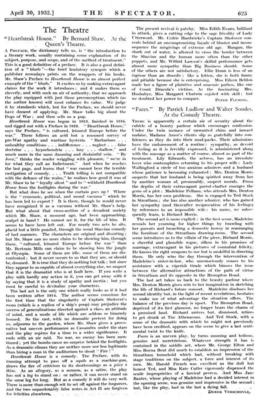"Faces." By Patrick Ludlow and Walter Sondes. At the Comedy
Theatre.
THERE. is apparently a certain air of security about the cubicle of a beauty parlour which encourages confession. Under the twin menace of unwanted chins and inward malaise, Madame Amor's clients slip as gratefully into con- fidences as they do into their mud-packs. Their admissions have the endorsement of a routine : sympathy, as devoid of feeling as it is fervidly expressed, is administered along with the massage as a matter of course, almost as part of the treatment. Lily Edwards, the actress, has an irresolute lover who contemplates returning to his proper wife : Lady Wallingford a circle of too anxious admirers and a husband whose patience is becoming exhausted : Mrs. Denton Morris suspects that her husband is being spirited away from her by another woman of, presumably, suspect morals. From the depths of their extravagant parrot-chatter emerges the germ of a plot : Madeleine Pelham, who attends Mrs. Denton Morris, has her own problems. She is engaged to Ted Stock in Streatham ; she has also another admirer, who has gained her sympathy (and thereafter reciprocation of his feelings) by references to an impossible wife : his name, we subse- quently, learn, is Richard Morris.
The second act is more explicit : in the first scene, Madeleine reveals her yearning for higher things by brawling with her parents and broaching a domestic heresy in rearranging the furniture of the Streatham drawing-room. The second scene introduces its to the villain of the piece, Richard Morris, a cheerful and plausible rogue, silken in his pMmises of marriage, extravagant in his pictures of connubial felicity. He knows the right weapons to use but is unskilful in directing them. He only wins the day through the intervention of Madeleine's sister-in-law, who unconsciously comes to his assistance with u viperish tirade which biasses the issue between the alternative attractions of the path of virtue in Streatham and its opposite in the Brompton Road.
The last act takes us back to the beauty parlour where Mrs. Denton Morris gives rein to her imagination in sketching the life of Richard's future consort. Madeleine discloses her second identity but, in the light of recent revelations. hesitates to make use of what advantage the situation offers. The balance of the previous day is upset. The Brompton Road. deprived of its first glamour, no longer bears the charm of a promised land. Richard arrives but, dismissed, retires to get drunk at The Athenaeum. And Ted Stock, with u sense of the dramatic with which he might not previously have been credited, appears on the scene to give a last senti- mental twist to the knife.
Faces is an uneven play, by turns arousing and tedious, genuine and meretricious. Whatever strength it has is contained in the middle act, where Mr. George Elton and Miss Buena Bent did much to establish an impression of the Streatham household which had, without breaking with stage traditions on the subject, a force and interest of its own. Mr. Harold French was excellent' as the dull but honest Ted, and Miss Kate Cutler vigorously dispensed the senile improprieties of a farcical peeress. And Miss Jane Baxter, whose playing of Madeleine had a decided interest in the opening scene, was genuine and impressive in the second : but, like the play, had in the last a dying ball.
DEREK VERSCHOYLK..






































 Previous page
Previous page